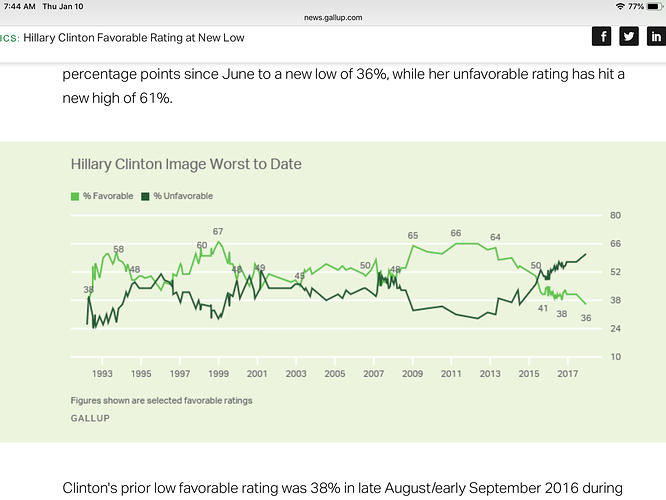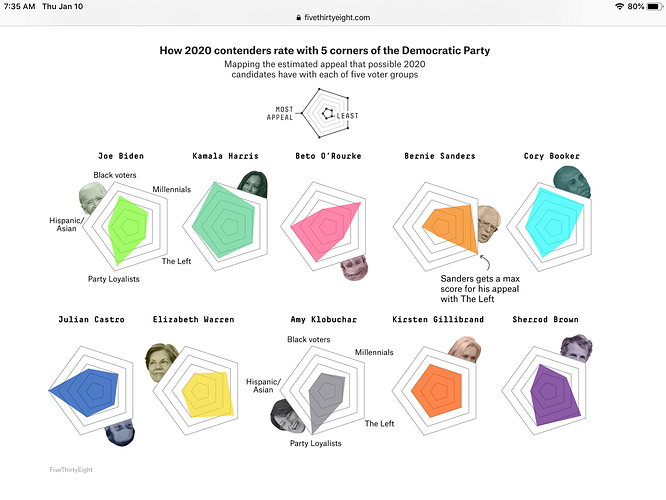simmer down now, simmer down!
I don’t think you worry about agreed upon by vast numbers. I think you simply ask from a series of possible responses related to policy, “thinks like me”, “can beat Trump”, and/or other stuff for voters to rank them in order of importance in what they’re seeking from a Democratic presidential candidate.
“Can beat Trump” seems to be what holds sway.
Now, that may fold in a lot of other factors, which by all means can include policy first and foremost in someone’s thinking. But more than anything else that’s the response.
Ah, well phrased that way you’d have to be an idiot to pick anything else. What’s the point of having a politician who matches your beliefs entirely if they can’t ever beat their political opponents? It just seems like the term ‘electability’ is all-too-often used as shorthand for centrist policies, which recent political history (and political history before the great moderation) would suggest is a poor way to think.
It’s certainly broad, obviously. And obviously open to multiple interpretations and the eye of the beholder. But what it does suggest is that maybe the candidate(s) of what might be a dozen or so serious Democratic primary challengers in 2020 who can best make the argument that they can beat Trump – over specific policy initiatives – could take the nomination. It’s certainly an angle to watch.
And that “I can beat Trump” argument needn’t come from a centrist ideology.
So Democrats of a more center-left ideological leaning, or who feel a more pragmatic bent, are worth equating to antisemites and Nazi sympathizers? I just want to fully understand what you’re accusing people who may only share 75-90% of your own political beliefs of being.
People said this and then voted for jill Stein.
I remember John Kerry emerging the surprising winner in Iowa in 2004 because of electibility. Democrats wanted to beat George W Bush above all else, so Iowans chose who they thought was the safest candidate to do so. As a reaction to that, I felt that in 2008 they went the other way, going with the candidate they were more passionate about (Obama). I wonder if they’re now going to swing back toward a safe electable candidate this time.
I dunno. I think you can look at 2008 through a 2016 prism now and say that Iowa Democratic Caucusers definitely went for electability in Obama too, by basically voting away from Hillary. Heck, she finished third. It was Edwards – another “electable” candidate – who came in second.
I think it was more Hillary was uniquely unlikable. I get upset when people compare Warren to Hillary- they’re completely different.
Why is Hillary unlikable, uniquely or otherwise? I just never understood that. I actually liked her wonky, policy-loving personality.
Probably a big part of it is just hit pieces on her dating back to 1992, and honestly even before that back in Arkansas. Seems like metric tons of ink were spilled in tearing her down, sometimes very justifiably. Many times, not. And her tendency to bunker up and maintain ridiculous secrecy about mundane stuff did her few favors.
One major source of her not being liked was that she was the focus of a decades long propaganda effort against her from the right, which was mostly based upon her being an uppity woman. Literally my first political memory was from the 90’s and going to the neighbor’s house for dinner, and being surprised by the raw, volcanic, and quite vocal hatred that the neighbor had for Hillary. Give that sort of attitude a few decades to feed and fester and you see how she was unlikable by the people on the right.
On the left, there were criticisms of her too. I voted for Hillary, but on a range of topics it would have been nice to be able to say to the republicans that “the democrats don’t do that bad thing, we’re better than that” and instead having to say “well, we do that bad thing, but only at ~10% of the level the republicans do it”. I’m not sure if this is the same as being unlikable, but it did make it difficult to be ride-or-die for her.
Yep, very well put.
My 2c: voting for the iraq war, voting for the patriot act, has alot of banker friends, and finally having a ‘wonky’ policy-loving personality when your only good ones were lifted from the platform of your primary opponent. In terms of likability, going up against Trump was the best thing that could have happened to her as anyone is likable relative to that dude.
And honestly, filtered through a prism of not knowing how 2016 would end up, Hillary was also seen as the “electable” candidate for the Democrats as well. Bernie was the guy people were passionate about, which is another blow to Rock8Man’s pendulum swing postulate.
Hillary won because older Southern black women were very loyal to the Clinton name, and they dominate the southern Primaries, which were what put Hillary over the top.
Hillary was unlikable in the 90s, and had so many issues with authenticity and credibility that anything she said people assumed the worst. Even folks voting for Hillary didn’t like her all that much. The local precinct was handing out noseplugs, and a coworker who was doing minority outreach warned me that Trump was likely to win based on the trouble she was having outside of that core group.
I think Hillary would have been a competent president, but ineffective due to low popularity, and we’d be seeing 60 Republican Senators and A Republican majority of 50-60 in the House right now.
A lot of people seemed to like Hillary, so I don’t know what it means to say she was uniquely unlikeable. And I don’t just mean that a lot of people voted for her; a lot of people were genuinely approving, at least at one point.
So, was she unlikeable, or did years of press bias change people’s minds? I think the latter, personally.
I think that’s all projection, really. You don’t like her, that’s clear, but most other people seemed to. Here’s a view of her approval rating over time. She was quite popular for most of her public life.
This from FiveThirtyEight is an interesting way of evaluating the potential candidates. Looking at this, you’d think the people with a good chance to win through are Harris and Booker.
Part of the issue with Clinton is that she was divisive on the left and unifying on the right.
Many on the left saw her as a a classic neo-liberal who favored banking and corporate interests over the common people and whose beliefs seemed more influenced by political expediency than passion. In an effort to dispel the notion that she was week, Hilary was also very in favor of war with Iran when she ran against Obama. She was a member of the Democratic establishment at a time when many on the left were feeling frustrated with that establishment.
That having been said, I think the Hilary of 2016 had matured a lot and she began to win me over by the end based on her clear qualifications, an evolution on some policy and an increased level of passion on some important liberal positions. She was also more comfortable and, accordingly, charismatic by 2016.
Then again, for true progressives, there lingered frustration that the Democratic establishment had put their thumb on the scales for her, freezing out legitimate choices during the primary season. This was their right and helped protect her from a bruising primary battle but it was blatant and distasteful to people who already had concenrns about her being too establishment.
The hold your nose and vote candidate has not won a presidential election in my lifetime. The Democrats need to find someone who folks are genuinely enthusiastic about, and, like it or not, charisma is a huge factor in building enthusiasm.

